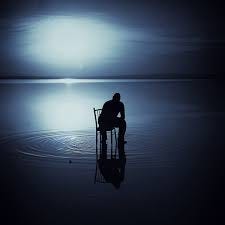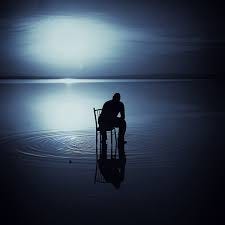Like most of us I use my mind as a head torch. I use it to discriminate, interpret, understand, theorise, summarise. I use it to downsize unwieldy mental properties into something I can live with. My mind is how I see things Yet, to quote Anais Nin, who in turn was riffing off the Talmud - We don’t see things as they are. We see them as we are.
Objectivity is an illusion. The mind doesn’t like that idea. The mind is the control tower. The mind is the bright light. I love my mind. But it’s not my totality. I know this because of the creative work I do. I can’t do it without my mind. But I can’t do it with my mind alone.
Every word written is a net to catch the word that has escaped.
I put that in a story. Then I looked at it. It felt like a message to me. Did it mean I had to run around with my Word-Net, catching as many of these things as I could? Pinning them down in an order? No. It didn’t mean that. It meant today’s title.
Words are the part of silence that can be spoken.
My life is words. Words are what I do. Words pay the bills. Words build me a platform. Words fly around the world on my behalf. Sometimes I fly with them. Words saved me when I was young, and go on doing so as I get older. Words are ropes, life-rafts, air-balloons, sentient cloud formations. Words come at my call like falcons. Words lure me deeper into the woods than I want to go. Words are friends of mine.
I trust words, not because they are perfect or objective, but because they are approximate and subjective, just as I am. The words are trying to do their best with what they have - which is me, and I am trying to do my best with what I have. Words.
The British poet, Samuel Taylor Coleridge, described poetry as ‘the best words in the best order.’ Dante, right back in the 1300’s talked about poetry as ‘putting into words things difficult to think.’
We need words. Words need us. Language expands when people use it. Changes when people use it. That’s the glory of language, and why we shouldn’t dumb down. We shouldn’t obfuscate either. Language is there to include. Anyone who uses language as a tool of exclusion is pompous, insecure, or vicious. Maybe all three. Not to exclude doesn’t mean dumbing down. Language is capable of clarity and beauty. If there is neither, well don’t blame language. It’s like a badly trained dog. Not the dog’s fault.
I hate cliches. Hate jargon. Hate academic blather. Language is better than that.
It’s better than that because of what surrounds it.
What surrounds language is not babble or noise. It’s silence.
Once we get beyond language as utility - directions, instructions, commands, all that everyday stuff we depend on, and once we get past language as higher-level thought, then language has to go in the opposite direction - not upwards in the service of the head-torch, but downwards, a long way down, into the depths of our non-verbal selves, where we process both experience and feeling in images, the way we do in our dreams. We know that in truth, you can’t have a thought without a feeling, but usually we separate thought and feeling. Language can restore the connection.
Language isn’t going directly for the image, as visual art does, or directly for the feeling-tone, as music can. Language has to find the words that find the feeling. Has to go past utility, out to the edgelands where nothing is safe, and where what is found there is brought back whole, as best we can, joining together the thoughts that get separated from their feelings, the feelings too overwhelming to let us think straight.
You know how it is… we say, ‘I don’t what to say. I can’t describe it. I’m speechless. I can’t get it off my chest. The words stick in my throat.’ And when we find ourselves here, in grief, or pain, or depression, or anger, or when we are bullied or abused or ignored, then it’s the words of others that can help us. Because the words are there, after all. Because the words we need are lifted out of the silence that surrounds them.
There’s a lot of good advice about stopping the chatter in our heads. We don’t need words all day long. We can do very well without any words at all. Watch how children play. Watch dancers. Watch visual artists or musicians. They are not in the word- game.
Mostly though, we are in the word-game, which is why reading really good stuff is really good for you! Get out of the low-level language: TV news, social media, crap-chat. Get in the company of better language! And strangely , when we do, and when we put in a bit of time to be with language that works at multiple levels, we find it both raises us up and calms us down.
If we are having language, let’s get a pack of the good stuff.
It helps to recall that language is not everything. Music and image are there for us too. Our brain needs other places to go. Going towards silence in this clamouring world is a good idea.
If it needn’t be said, try not saying it.
One of the nicest evenings you can spend with someone you know well is an evening where you say as little as possible. But this is the opposite of those horror-show restaurant sights where everyone at the table is on their phone. NO PHONES! Just cook together or draw together or listen to music. You can hug and smile, and hey, it’s not an exercise, so of course you can speak whenever you like… rather, it’s a mindful way, now and again, of cutting the crap. Sometimes, we’re all talked out. Ask the cat.
One thing I like to do in the evening, when it’s just me, is to listen to an actor read a long poem. The poem then becomes my inner self-state for the night, and onwards into my dreams. I find that I don’t noodle-doodle or make up to-do lists, or worry about anything. I am listening to words, but of the kind that take me nearer to silence.
I am going to switch off my head-torch in a minute and neither analyse nor question. I have some food and flowers from the garden. Here are smells, scents, beauty. There’s a glass of red wine too. I can see my ginger cat sitting on the outside table, ears taking in wavelengths lost on me. I can hear the birds busy with evening. Leaf rustle. Pond ripple. Frog-plop. I am breathing out.
Then, it will be bedtime, leaving the blinds up, watching the last light. I have said all I can say, for today.




This is so beautiful and to be read again and again
We need your words so much.
You are our Virginia Woolf.
"when we put in a bit of time to be with language that works at multiple levels, we find it both raises us up and calms us down." 🧡
Thanks for this!
These days I find myself turning back to stories, both in what I read and what I write. I am hungry for stories, and for language I can't own and that can't own me, that can blossom into community. This is how I keep going, how maybe we all keep going together.